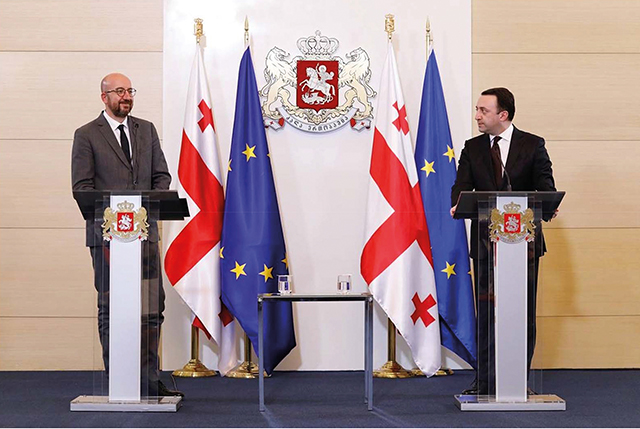Georgia has been a rising star among new NATO and European Union candidates for years.
After the 2003 Rose Revolution, and the sweeping reforms which took place in the years that followed, the light at end of the tunnel has been a formal integration. According to most estimates, Georgia’s ascension into NATO, the EU and the litany other smaller organizations within those two would have massive benefits for its economy and society.
It is possible that senior leaders do not share the same sentiments. It is unlikely that many people would oppose integration if it were offered the next day. The West has been frustrated by the vehemence of the citizens and business community and the lackluster efforts of many of the ruling party leaders.
After the 2020 elections, a growing number of European and American politicians began to voice their concerns about the apparent disconnect. Concerns arose over the disparity between Georgia’s roadmap for social and political success and the decisions taken by its leadership. As 2021 progressed Europe and the United States became increasingly forced to apply pressure due to mismanagement of government funds, willful judicial neglect, and the refusal of certain party members to reach some form of political reconcilliation.
Last summer, representatives from the diplomatic and legislative offices of the EU and America organized a document that aimed to unite Georgia’s political community. This agreement, which is often called the “April 19th Agreement,” was championed by European Council president Charles Michel. It sought to find a compromise between opposition and the ruling Georgian Dream Party.
The ruling party, however, withdrew despite numerous meetings at the end July. The ruling party’s reasoning was that the opposition had refused to sign an agreement at the time. However, the agreement they reached in September did not result in the resignation of the ruling party.
Georgian Dream’s decision-makers then pushed for the appointment of judges to the Supreme Court as soon as possible. The process of installing these officials was said to be in contradiction with the April 19 Agreement, and detrimental to rule of law. As many foreign observers have noted, this core concept, the essence and foundation of rule of law has been under attack ever since the riots that took place outside the Parliament on June 20, 2019.
According to a list of American, European and other independent officials who have expressed their opinions, the weaponization of law enforcement and judicial system and the targeting of political rivals undermines Georgia’s ability to grow. The 2021 legal reforms, which were to be adopted by Georgia in the near future, and their abandonment later caused tensions between European and Georgian leaders.
The statements of MEP Viola von Cramon, and Irakli Garribasvili in relation to the EUR 75 Million in EU macro-financial aid that was contingent on these reforms are noteworthy. Garibashvili stated that the country would reject the loan package because of the growing success in the Georgian economy. He claimed, despite evidence to the contrary that the growth outweighed any need for additional foreign debt. Cramon responded quickly, saying, “This isn’t the first time Georgian Dream has broken its promise.” Breaking the agreement destroys trust and makes Georgian Dream an entity you cannot trust.
EU officials have made more statements that question the true intentions and even suggest a final decision. The government and the people will have to make a decision about their future as the current leadership is isolating the nation from the West. Andrius Kubilius, a member of the European parliament, recently emphasized this by saying: “All of this creates an unfavorable image for Georgia. Not only the government, it harms the desire for European integration of the Georgian population.”
Former US Ambassador to Georgia Ian Kelly coined “foreign policies by insult” in order to frame the situation. Senior officials have repeatedly ridiculed and dismissed recommendations from American and European leaders regarding the direction of Georgia. Irakli Kobakhidze, the Chairman of Georgian Dream, has recently reacted to statements condemning abolitionists of the State Inspector’s Service. This dismissal, which was seen as a blow against corruption and unfair business practices, is largely viewed as a sign that Georgia’s political progress has reversed.
It is easy to dismiss the shift as a bump on the road to EU or NATO integration. The country is right to be concerned and worried, given the international rift that has emerged and the national reforms which have pushed the country back several decades. This sentiment is amplified even more by the fact that Putin’s desire to control the South Caucasus will only increase as this issue grows.
Both sides need to reach an agreement on the short-term, primarily to cool the simmering tension. In the long term, a mechanism is needed to ensure Georgia’s westward path. Leaders in the United States and Europe must do more than condemn and write creative letters. The Georgian leadership, meanwhile, needs to commit itself to a genuine transparency with both its people and Western leaders. Only by committing to these core values and a genuine desire to make positive changes towards the EU and NATO standards can Georgia enter a new golden age.
By Michael Godwin
Read More @ georgiatoday.ge




